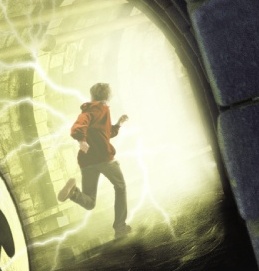Greetings to all Deja Vu-ists! This is a Do Over for a blog post I wrote in the beginning of 2015. The topic is …
PACING
 I recently received a long-awaited revision letter, and one of the first items on my editor’s list of things to address was: Speed up the pacing at the beginning.
I recently received a long-awaited revision letter, and one of the first items on my editor’s list of things to address was: Speed up the pacing at the beginning.
Immediately, my mind started running through what events I could cut. Or make more exciting. Could I slash more words from the text? Should I make things happen faster? (There’s a reason Jax is running on the cover of all the books, right?)
This is the third book I’ve revised for this editor, and I really should know her better by now! When I read more carefully through her letter it became apparent she wasn’t looking to cut events or slash words. In fact, to improve the pacing, I often needed to add words to scenes—spelling out the very important element I hadn’t made clear in the text: the stakes.
 I know what the stakes are. My characters know, too. Therefore I mistakenly assume that my readers know as well. But sometimes the stakes get lost or buried in the events of the story, and when the reader forgets what they are, that’s when the pacing falters.
I know what the stakes are. My characters know, too. Therefore I mistakenly assume that my readers know as well. But sometimes the stakes get lost or buried in the events of the story, and when the reader forgets what they are, that’s when the pacing falters.
What’s the goal? What’s the deadline? What happens if the goal isn’t met, and how much time is left? These are the things that need to be hit – repeatedly and hard – in a MG adventure. In my books, days of the week are important because there’s a secret eighth day and some characters exist only on that day. My editor wants me to remind readers what day it is. Often. They should practically hear the clock ticking in the background.
 She also suggested I avoid talking about people waiting even when they must do so. Instead of writing “There was nothing he could do until Grunsday, when Evangeline would be back” I need to describe what other people are up to during that time. How are they striving to meet their goals, overcome the opposition, or raise the stakes for the main conflict?
She also suggested I avoid talking about people waiting even when they must do so. Instead of writing “There was nothing he could do until Grunsday, when Evangeline would be back” I need to describe what other people are up to during that time. How are they striving to meet their goals, overcome the opposition, or raise the stakes for the main conflict?
Perhaps the third time will be the charm? Maybe I’ll learn the lesson my editor is teaching me and improve this skill on my next manuscript. Pacing isn’t about writing nothing but pulse-pounding action scenes. It’s about focus and tension with an eye always on the stakes.
Read more great Do Over posts by following the Blogfest!

It’s so funny how we still have lessons to learn, even after completing multiple novels. In my newest ms, I found myself thinking that it was really dialogue-heavy in a few scenes, and had to make a conscious effort to balance it with more internal monologue from the mc. And I’m not even done yet. I can’t wait to see what kinds of dumb mistakes my betas and editor will point out once I hand it in!
Editing and re-editing. It almost seems endless. And each work has different editing requirements. But for me, a switch from one editing voice sometimes pays dividends in other works I’m doing at the same time.
When I read to improve the pacing, I often needed to add words, my jaw dropped. But your explanation totally makes sense. Great tip! Thanks for posting it again for us. 🙂
The smoother and slicker the start, the easier it is for me to get sucked into the story. Good beginnings are so essential.
Arlee Bird
Tossing It Out
Great lessons for any writer. That’s all part of the process. We learn, revise, and learn some more. These sound like great lessons for any writer to learn.
Stakes are so important. I can’t get invested in reading a book without them. And I love the feel of a ticking clock!
Excellent choice!
Hi Dianne – what a great post … one I suspect slipped by soon after I had my hip op. How very interesting to read about … and having to keep track of that illusive, but very definitely part of the story, eighth day …
Have a lovely Christmas and festive season – and here’s to an even better 2016 – you’ve had a great year this year .. cheers Hilary
Pacing is a tricksy critter, and not one I have tamed yet either. Here’s hoping we both keep learning how to spool it out and when to reel it in.
Always knowing the stakes and what happens if the characters’ goals aren’t met sound like crucial things to hit hard with for any book, not just MG. ^_^ Especially at the beginning. And now I can’t help but wonder how badly I bungled that in the book I’m trying to get published, as it’s always felt like it started a little too slowly. Grr. Arg.
Loved this post. I’m making notes right now. 🙂
Anna from elements of emaginette
If I’d gotten an editor letter telling me to speed up the pace, I’d have thought exactly what you did — I’d have looked for places to cut so things would go faster. And I know just what you mean by the fact that *you* know things the reader doesn’t. I often wonder why my CPs ask questions about things … can’t they just read my mind and know what I *meant* to write? LOL
Wishing you and your family a wonderful holiday season and a terrific 2016!!
That’s a really good reminder! Thanks and happy Christmas!
What a good post to see again. Pacing is tricky. Interesting to see what’s important in the waiting.
What a great post! Interesting to read your thought process. I would have initially been thinking the same things you were about cutting text, etc. Good thing you know your editor well and could stop and think about what they wanted you to do. Editors are SO amazing. Best of luck!